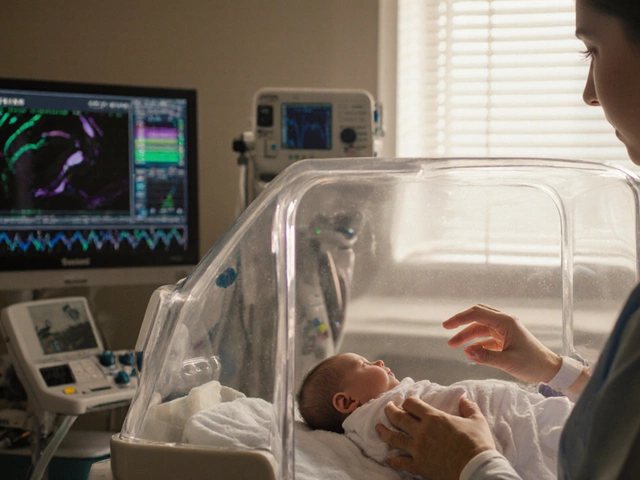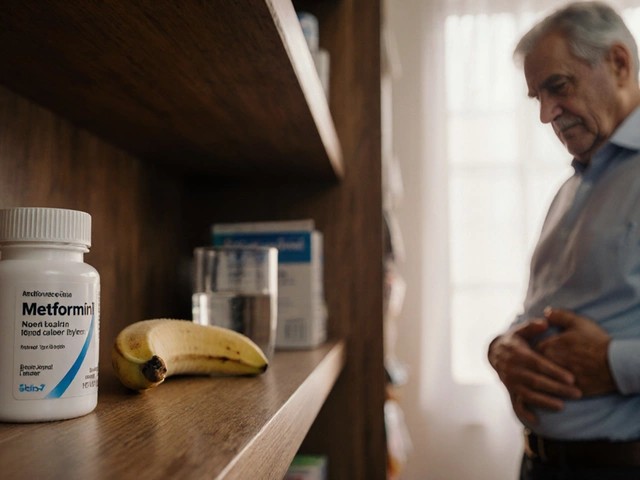Cancer, the big C, is one of those life-changers nobody wants to face, yet many do. When someone gets that diagnosis, the first thing that often pops up is, "How long do I really have?" The truth? It’s not as straightforward as we’d like. Every person's journey is different, dotted with unique obstacles and victories.
So, how does it work? How long can you really live with cancer hanging around? Well, it's all about the type of cancer, how early it's caught, and what kind of treatment is available. Some folks defy odds and statistics, living for decades after diagnosis. Others may have a more uphill battle, but that doesn't mean there isn't hope or a good quality of life along the way.
Thanks to medical advancements, survival rates are climbing. Treatments are becoming more targeted and effective, which means more days, months, and even years we call a win. And while some types of cancer are notoriously sneaky, early detection can be a game-changer, flipping the odds in your favor.
- Understanding Cancer Survival Rates
- Factors Affecting Lifespan with Cancer
- Role of Early Detection
- Advancements in Cancer Treatments
- Living Well with Cancer
Understanding Cancer Survival Rates
When you hear about cancer survival rates, it might sound a bit grim, but it's actually a helpful measure. These rates tell you the percentage of people with the same type and stage of cancer who are still alive after a certain amount of time, usually five years after diagnosis. This doesn’t mean someone’s got a countdown timer; it’s more of a statistical snapshot.
Why are these numbers handy? Well, they give doctors and patients a way to talk about what might happen. It’s not about predicting the future for any one person but understanding what’s common based on a ton of past cases.
Different cancers have different survival rates. For instance, the five-year survival rate for breast cancer is around 90%, thanks to advanced treatments and early detection. On the flip side, pancreatic cancer has a much lower rate, which hangs at about 10%, underlining why catching it early and innovation in treatments are super important.
Here’s a quick glance at some survival rates:
| Cancer Type | Five-Year Survival Rate |
|---|---|
| Prostate Cancer | 98% |
| Lung Cancer | 22% |
| Colorectal Cancer | 65% |
These rates can guide treatment choices, showing which path has led to more thriving results. But remember, stats don’t have the last say. With a motivated healthcare team and an informed patient, there's room for hope and plenty of reason to stay optimistic.
If nothing else, understanding these rates can set a baseline for discussions about cancer diagnosis and what treatments could turn the tide in a positive direction.
Factors Affecting Lifespan with Cancer
When we talk about living with cancer, numerous things come into play. Not all cancers themselves are equal—some are more aggressive, while others grow slowly. The type of cancer diagnosis you have matters a lot. For instance, a person with metastatic melanoma might face different challenges than someone with an early-stage lymphoma.
Another biggie? The cancer stage at diagnosis. Simply put, early detection usually offers a better shot at a longer life. When cancer is caught in an early stage, treatments are often more effective and the chances of survival are higher.
Treatment options also throw their hat in the ring. We've come a long way from just chemotherapy and radiation. Now, there are targeted therapies, immunotherapy, and even personalized medicine thanks to genetic profiling. These new treatments can sometimes work miracles where old ones fell short.
A person’s overall health and lifestyle play a role too. If someone is already in tip-top shape, their body might handle the stress of cancer treatments better. Diet, exercise, and mental health aren't just buzzwords; they're real tools that can enhance life quality and even longevity.
Lastly, let's not forget about advancements in cancer treatment. New research and innovative therapies are coming out all the time, giving hope for longer lives. Doctors and scientists are constantly trying to outsmart cancer, and every little breakthrough counts. Plus, support from family and friends can provide emotional strength that's indispensable during the journey.
- Type of cancer and how aggressive it is.
- Stage at the time of diagnosis.
- Treatment options available and their effectiveness.
- Overall health and lifestyle of the individual.
- Access to the latest medical advances and support systems.
By understanding these factors, you can have open and informed discussions with your healthcare team, giving yourself the best shot at a longer, fuller life.
| Factor | Impact on Lifespan |
|---|---|
| Cancer Type | Varies based on aggressiveness and location. |
| Stage at Diagnosis | Earlier stages typically have a better prognosis. |
| Treatment Options | Advanced treatments improve survival rates. |
| Overall Health | Good health aids better recovery and coping. |
| Support Systems | Emotional and psychological support can boost quality of life. |

Role of Early Detection
When it comes to battling cancer, catching it early is like getting a head start. The earlier you find it, the better your chances of managing it effectively. Early detection can make a huge difference in the cancer survival game. It often means you have more treatment options and a better shot at living longer.
Many types of cancer don’t show symptoms until they've progressed, and that's why routine screenings are a lifesaver. Tests like mammograms for breast cancer, Pap smears for cervical cancer, and colonoscopies for colon cancer are crucial. They’re like your safety net, catching things early before they spiral out of control.
- Breast Cancer: Women 40 and older are often advised to get annual mammograms. Early detection can mean the difference between a simple lumpectomy and a more invasive surgery.
- Cervical Cancer: Regular Pap smears can catch precancerous changes before they develop into full-blown cancer.
- Colorectal Cancer: Colonoscopies not only detect cancer but can also prevent it by removing polyps before they turn cancerous.
Here’s a quick look at some numbers to hammer this home:
| Cancer Type | 5-year Relative Survival Rate |
|---|---|
| Breast Cancer (early stage) | 99% |
| Colon Cancer (early stage) | 90% |
The stats speak for themselves: early detection boosts life expectancy significantly. It's about beating cancer to the punch, giving you the upper hand.
In a nutshell, keeping up with regular check-ups and screenings can save your life. Maybe it’s time to check your calendar and see if you’re due for any.
Advancements in Cancer Treatments
When it comes to snuffing out cancer, we’ve seen some pretty cool breakthroughs in recent years. The world of cancer treatment isn’t what it used to be. Gone are the days when options were limited to just ripping through chemo or braving it out with radiation therapy alone. Today, researchers and doctors are pulling out all the stops to prolong life and, more importantly, improve the quality of it.
One game-changer? Immunotherapy. This is like arming your body's own defenses to go after the invaders. It's getting headlines for its success in treating certain types of cancer, like melanoma and lung cancer. This isn't just a fancy trial thing anymore—it’s becoming a standard weapon in the cancer treatment arsenal.
Then, of course, we've got targeted therapies. Instead of carpet-bombing your whole body with drugs, these treatments zero in on specific genes or proteins that cancer cells hang on to. This makes them more effective and less brutal on the rest of your system.
And let’s not forget precision medicine, which is like a personalized plan for beating cancer based on your unique genetic makeup. It’s like having a tailor-made suit, but way more important, obviously.
There's even buzz around cancer vaccines. Unlike the flu shot, these aren’t preventing cancer but helping treat it by boosting the immune system’s ability to fight cancer cells.
To put things in perspective, here's a quick look at how these treatments are impacting survival rates:
| Cancer Type | Improvement in Overall Survival Rate with New Treatments |
|---|---|
| Melanoma | 30-40% |
| Lung Cancer | 25% |
| Breast Cancer (HER2+) | 20% |
So, it's safe to say we're in an era where living longer and better with cancer is more possible than ever. Research never stops, and with the tech-savvy world driving these discoveries, the future of cancer treatment is looking as promising as ever.

Living Well with Cancer
So, you’ve got this diagnosis. What's next? Living well with cancer isn’t just about surviving; it’s about thriving in your own personal way. There’s an incredible community out there who’ve turned their cancer journeys into paths of strength and resilience, proving that life doesn’t just grind to a halt because of it.
First things first, your mental health is just as critical as your physical health when it comes to living with cancer. Managing stress, anxiety, or depression can make a world of difference. Jump into activities that lift your spirits—this could be anything from yoga to art classes or just good old laughter with friends.
Don't ignore the impacts diet and exercise have on your quality of life. Eating well and staying active can boost your immune system and improve treatment outcomes. Think fruits, veggies, lean proteins, and regular light exercise like walking or swimming. Like ticking off a checklist, these make sure your body stays strong as it fights.
Building a care team you trust and communicate well with can be a massive support. They're not just there for the medical stuff—they can provide emotional backing too. So, find doctors and healthcare providers who listen and help you understand your treatment options and progress.
It’s also about setting realistic goals. Maybe it's about seeing your grandkid's graduation or traveling a bit. Keep those goals in sight, and don’t shy away from celebrating each little win along the way. There's power in positivity, and focusing on what you can achieve rather than what you can't makes all the difference.
And hey, it’s okay to ask for help or join support groups filled with folks going through the same thing. They get it. Being part of a community, whether online or in person, can provide that extra layer of comfort and advice from those who’ve walked the walk.
Remember, cancer isn’t the end of your story. It’s a chapter, sure, but how you write the next part is up to you.





